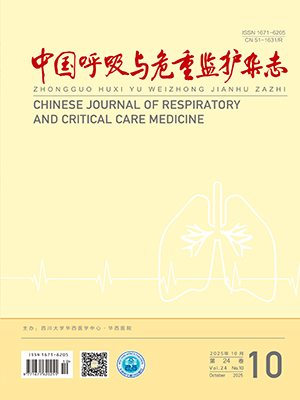| 1. |
Cecconi M, Evans L, Levy M, et al. Sepsis and septic shock. Lancet, 2018, 392(10141): 75-87.
|
| 2. |
曹钰, 柴艳芬, 邓颖, 等. 中国脓毒症/脓毒性休克急诊治疗指南(2018). 临床急诊杂志, 2018, 19(9): 567-588.
|
| 3. |
Fleischmann C, Scherag A, Adhikari NK, et al. Assessment of global incidence and mortality of hospital-treated sepsis. Current estimates and limitations. Am J Respir Crit Care Med, 2016, 193(3): 259-272.
|
| 4. |
Markwart R, Saito H, Harder T, et al. Epidemiology and burden of sepsis acquired in hospitals and intensive care units: a systematic review and meta-analysis. Intensive Care Med, 2020, 46(6): 1536-1551.
|
| 5. |
Rudd KE, Johnson SC, Agesa KM, et al. Global, regional, and national sepsis incidence and mortality, 1990-2017: analysis for the Global Burden of Disease Study. Lancet, 2020, 395(10219): 200-211.
|
| 6. |
Kawade N, Tokuda Y, Tsujino S, et al. Dietary intake of ascorbic acid attenuates lipopolysaccharide-induced sepsis and septic inflammation in ODS rats. J Nutr Sci Vitaminol (Tokyo), 2018, 64(6): 404-411.
|
| 7. |
May JM, Harrison FE. Role of vitamin C in the function of the vascular endothelium. Antioxid Redox Signal, 2013, 19(17): 2068-2083.
|
| 8. |
赵冉冉, 李素玮, 万献尧. 维生素C对脓毒症微循环影响的研究进展. 中华内科杂志, 2021, 60(9): 852-856.
|
| 9. |
Jamshidi MR, Zeraati MR, Forouzanfar B, et al. Effects of triple combination of hydrocortisone, thiamine, and vitamin C on clinical outcome in patients with septic shock: a single-center randomized controlled trial. J Res Med Sci, 2021, 26: 47.
|
| 10. |
Hussein AA, Sabry NA, Abdalla MS, et al. A prospective, randomised clinical study comparing triple therapy regimen to hydrocortisone monotherapy in reducing mortality in septic shock patients. Int J Clin Pract, 2021, 75(9): e14376.
|
| 11. |
Cumpston M, Li TJ, Page MJ, et al. Updated guidance for trusted systematic reviews: a new edition of the Cochrane Handbook for Systematic Reviews of Interventions. Cochrane Database Syst Rev, 2019, 10: ED000142.
|
| 12. |
Fowler AA 3rd, Truwit JD, Hite RD, et al. Effect of vitamin C infusion on organ failure and biomarkers of inflammation and vascular injury in patients with sepsis and severe acute respiratory failure: the CITRIS-ALI randomized clinical trial. JAMA, 2019, 322(13): 1261-1270.
|
| 13. |
Chang P, Liao YP, Guan JB, et al. Combined treatment with hydrocortisone, vitamin C, and thiamine for sepsis and septic shock: a randomized controlled trial. Chest, 2020, 158(1): 174-182.
|
| 14. |
Fujii T, Luethi N, Young PJ, et al. Effect of vitamin C, hydrocortisone, and thiamine vs hydrocortisone alone on time alive and free of vasopressor support among patients with septic shock: the VITAMINS Randomized Clinical Trial. JAMA, 2020, 323(5): 423-431.
|
| 15. |
Iglesias J, Vassallo AV, Patel VV, et al. Outcomes of metabolic resuscitation using ascorbic acid, thiamine, and glucocorticoids in the early treatment of sepsis: the ORANGES Trial. Chest, 2020, 158(1): 164-173.
|
| 16. |
Sevransky JE, Rothman RE, Hager DN, et al. Effect of vitamin C, thiamine, and hydrocortisone on ventilator- and vasopressor-free days in patients with sepsis: the VICTAS Randomized Clinical Trial. JAMA, 2021, 325(8): 742-750.
|
| 17. |
Lv SJ, Zhang GH, Xia JM, et al. Early use of high-dose vitamin C is beneficial in treatment of sepsis. Ir J Med Sci, 2021, 190(3): 1183-1188.
|
| 18. |
Zabet MH, Mohammadi M, Ramezani M, et al. Effect of high-dose Ascorbic acid on vasopressor's requirement in septic shock. J Res Pharm Pract, 2016, 5(2): 94-100.
|
| 19. |
Moskowitz A, Huang DT, Hou PC, et al. Effect of ascorbic acid, corticosteroids, and thiamine on organ injury in septic shock: the ACTS randomized clinical trial. JAMA, 2020, 324(7): 642-650.
|
| 20. |
Nabil Habib T, Ahmed I. Early adjuvant intravenous vitamin C treatment in septic shock may resolve the vasopressor dependence. Int J Microbiol Adv Immunol, 2017, 5(1): 77-81.
|
| 21. |
Rosengrave P, Spencer E, Williman J, et al. Intravenous vitamin C administration to patients with septic shock: a pilot randomised controlled trial. Crit Care, 2022, 26(1): 26.
|
| 22. |
Wani SJ, Mufti SA, Jan RA, et al. Combination of vitamin C, thiamine and hydrocortisone added to standard treatment in the management of sepsis: results from an open label randomised controlled clinical trial and a review of the literature. Infect Dis (Lond), 2020, 52(4): 271-278.
|
| 23. |
Hwang SY, Ryoo SM, Park JE, et al. Combination therapy of vitamin C and thiamine for septic shock: a multi-centre, double-blinded randomized, controlled study. Intensive Care Med, 2020, 46(11): 2015-2025.
|
| 24. |
Mohamed ZU, Prasannan P, Moni M, et al. Vitamin C therapy for routine care in septic shock (ViCTOR) trial: effect of intravenous vitamin C, thiamine, and hydrocortisone administration on inpatient mortality among patients with septic shock. Indian J Crit Care Med, 2020, 24(8): 653-661.
|
| 25. |
Salomão R, Ferreira BL, Salomão MC, et al. Sepsis: evolving concepts and challenges. Braz J Med Biol Res, 2019, 52(4): e8595.
|
| 26. |
Kuhn SO, Meissner K, Mayes LM, et al. Vitamin C in sepsis. Curr Opin Anaesthesiol, 2018, 31(1): 55-60.
|
| 27. |
Jung SY, Lee MT, Baek MS, et al. Vitamin C for ≥ 5 days is associated with decreased hospital mortality in sepsis subgroups: a nationwide cohort study. Crit Care, 2022, 26(1): 3.
|




